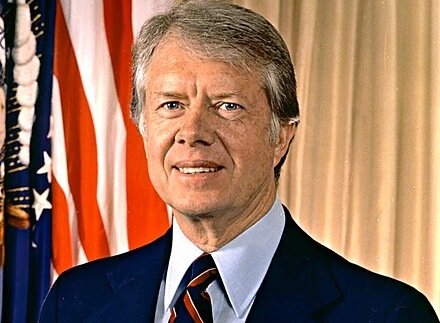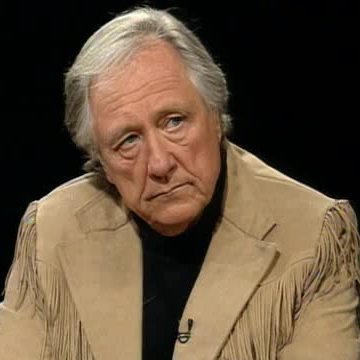JAMES EARL CARTER JR.: The U.S. Politician Ranked A Better Man Than President

Did you know that James Earl Carter Jr was the longest-lived president in United States' history and the first to reach the age of 100?
James Earl Carter Jr., born October 1, 1924, was an American politician and humanitarian who served as the 39th president of the United States of America from 1977 to 1981. A member of the Democratic Party, Carter also served as the 76th governor of Georgia from 1971 to 1975 and in the Georgia State Senate from 1963 to 1967.
Born and raised in Plains, Georgia, Carter graduated from the United States Naval Academy in 1946 and joined the United States Navy's submarine service. He married Rosalynn Smith, and they worked closely together throughout their lives.
Carter returned home after his military service and revived his family's peanut-growing business. Opposing racial segregation, he supported the growing civil rights movement and became an activist within the Democratic Party.
After serving in the Georgia State Senate and then as governor of Georgia, Carter ran for president in 1976. Initially a dark horse candidate not well known outside Georgia, he secured the Democratic nomination and selected Walter Mondale as his running mate. They narrowly defeated the Republican Party's ticket of President Gerald Ford and Senator Bob Dole.
On his second day in office, Carter pardoned all Vietnam War draft evaders. He created a national energy policy that included conservation, price control, and new technology. Carter successfully pursued the Camp David Accords, the Panama Canal Treaties, and the second round of Strategic Arms Limitation Talks. He also confronted stagflation. He signed into law bills that established the United States Department of Energy and the United States Department of Education.
The last two years of Carter's presidency were marked by the Three Mile Island accident, the establishment of diplomatic relations with China, the Nicaraguan Revolution, the Soviet invasion of Afghanistan, and the Iranian Revolution, which resulted in the Iran hostage crisis and the 1979 oil crisis. In response to the Soviet invasion, he escalated the Cold War by ending détente, imposing a grain embargo against the Soviets, enunciating the Carter Doctrine, and leading the multinational boycott of the 1980 Summer Olympics in Moscow.
Carter and Mondale sought reelection in 1980, and were renominated by the Democratic Party after Carter defeated Senator Ted Kennedy in the party's primaries. They however lost by a landslide to the Republican ticket of Ronald Reagan and George H. W. Bush. Carter was the first elected incumbent president since Herbert Hoover in 1932 to lose a reelection bid.
After Carter's presidential term ended, he established the Carter Center to promote and expand human rights, leading to his receiving a Nobel Peace Prize in 2002 for his work in relation to it. He traveled extensively to conduct peace negotiations, monitor elections, and further the eradication of infectious diseases.
Carter was a key figure in the nonprofit housing organization Habitat for Humanity. He also wrote numerous books, ranging from political memoirs to poetry, while continuing to comment on global affairs; two of his books are about the Israeli–Palestinian conflict.
Polls of historians and political scientists have ranked Carter's presidency below average. Scholars and even many Democrats viewed his presidency as a failure. Historians ranked Carter's presidency as below average. After leaving office, Carter told allies he predicted history would be kinder to him than voters were in the 1980 election. In a 1982 Chicago Tribune survey, when 49 historians and scholars were asked to rank the best and worst U.S. presidents, Carter was ranked the tenth worst. In 2006, conservative British historian Andrew Roberts ranked Carter the worst U.S. president. Yet some of Carter's policy accomplishments have been more favorably received. Many generally view his post-presidency—the longest in U.S. history—more favorably.
The 2009 documentary Back Door Channels: The Price of Peace credits Carter's efforts at Camp David, which brought peace between Israel and Egypt, with bringing the only meaningful peace to the Middle East. Stuart E. Eizenstat, who served as Carter's chief White House domestic policy adviser, wrote, "Carter's accomplishments at home and abroad were more extensive and longer lasting than those of almost all modern presidents."
While historians generally consider Carter a below-average president, his post-presidency activities have been universally praised, including his peacekeeping and humanitarian efforts. The Independent wrote in 2009, "Carter is widely considered a better man than he was a president."
Carter died at his home in Plains, Georgia, on December 29, 2024, at the age of 100. This followed his February 2023 decision to enter hospice. Shortly after the announcement, President Joe Biden released a statement honoring Carter's legacy, calling him a "man of principle, faith, and humility". The Biden administration also announced plans to hold an official state funeral, and a day of mourning for him on January 9, 2025.
SOURCE: Wikipedia
#penglobalpersonality #JamesCarter



